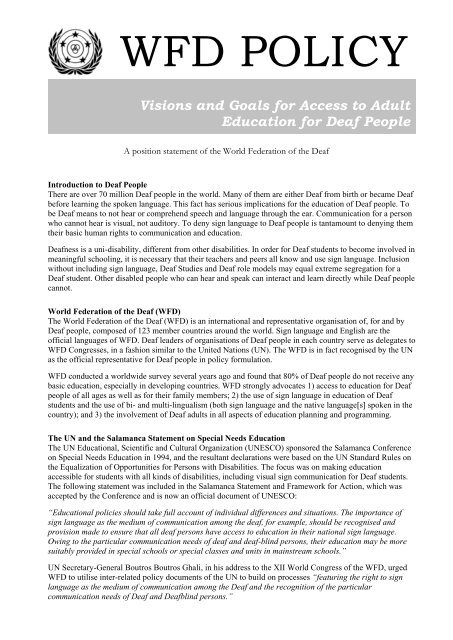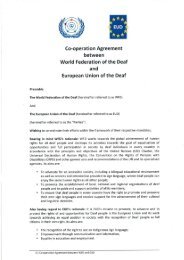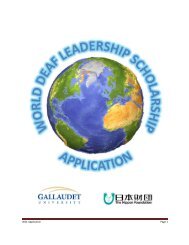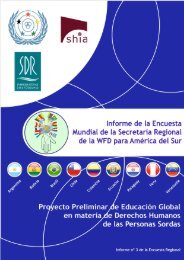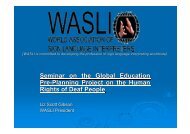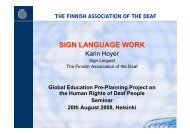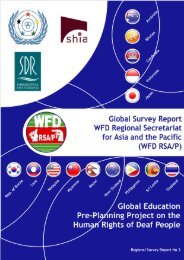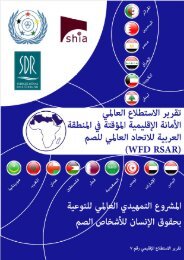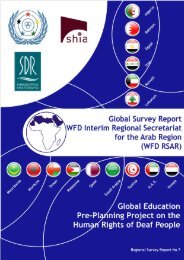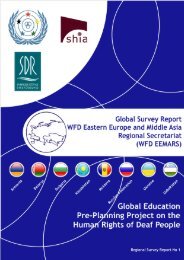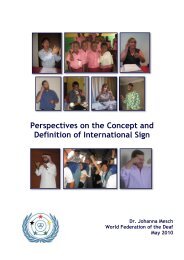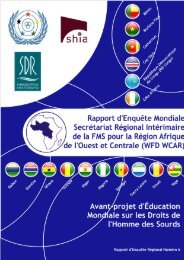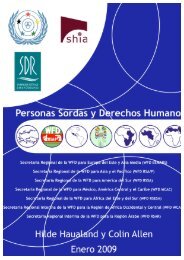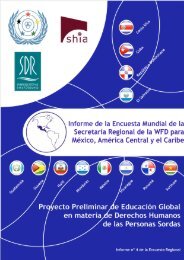Introduction to Deaf People - World Federation of the Deaf
Introduction to Deaf People - World Federation of the Deaf
Introduction to Deaf People - World Federation of the Deaf
Create successful ePaper yourself
Turn your PDF publications into a flip-book with our unique Google optimized e-Paper software.
WFD POLICYVision and Goals for Access <strong>to</strong> Adult Education for <strong>Deaf</strong> <strong>People</strong>The Gallaudet University Declaration on Adults with Special Learning NeedsThe Gallaudet University Declaration adopted by participants at <strong>the</strong> First National Congress on Adults withSpecial Learning Needs at Gallaudet University in 1987 included a statement <strong>of</strong> principles, a few <strong>of</strong> whichare quoted here: “Lifelong learning for adults with special learning needs must be developed with <strong>the</strong>ir fullparticipation, <strong>to</strong> assure that it responds <strong>to</strong> <strong>the</strong>ir education needs and goals and accommodates <strong>to</strong> <strong>the</strong>ir styles… It should include opportunities beyond basic education and vocational skills for personal and socialdevelopment, aes<strong>the</strong>tic pleasures, and advanced academic and pr<strong>of</strong>essional study where appropriate …Lifelong learning for adults with special needs must be sensitive <strong>to</strong> issues <strong>of</strong> cultural, linguistic, gender, andeconomic diversity.”UNESCO and <strong>the</strong> Hamburg Statement on Adult Education RightsThe Fifth International Conference on Adult Education (CONFINTEA V), which met in Hamburg, Germany,in 1997, resulted in a declaration and agenda for <strong>the</strong> future which affirmed that adult education not onlyexpands knowledge, it also promotes human rights, active citizenship and effective democracy in eachcountry. Education and employment are essential <strong>to</strong> a good quality <strong>of</strong> life. “Adult education becomes morethan a right; it is a key <strong>to</strong> <strong>the</strong> twenty-first century. It is both a consequence <strong>of</strong> active citizenship and acondition for full participation in society. Recognition <strong>of</strong> <strong>the</strong> right <strong>to</strong> education and <strong>the</strong> right <strong>to</strong> learnthroughout life is more than ever a necessity; it is <strong>the</strong> right <strong>to</strong> read and write, <strong>the</strong> right <strong>to</strong> question andanalyze, <strong>the</strong> right <strong>to</strong> have access <strong>to</strong> resources, and <strong>to</strong> develop and practice individual and collective skills andcompetencies.”Topics discussed during this conference and embodied in <strong>the</strong> adult education principles included access <strong>to</strong>and involvement in adult education for adults with disabilities, <strong>the</strong> need for policies and practices <strong>to</strong>accommodate people with disabilities and <strong>to</strong> consider linguistic, gender and economic diversity. “Learningthroughout life implies a rethinking <strong>of</strong> content <strong>to</strong> reflect such fac<strong>to</strong>rs as age, gender equality, disability,language, culture and economic disparities. Adult learning should reflect <strong>the</strong> richness <strong>of</strong> cultural diversityand respect traditional and indigenous peoples’ knowledge and systems <strong>of</strong> learning; <strong>the</strong> right <strong>to</strong> learn in <strong>the</strong>mo<strong>the</strong>r <strong>to</strong>ngue should be respected and implemented … We urge UNESCO <strong>to</strong> encourage Member States <strong>to</strong>adopt policies and legislation that are favourable <strong>to</strong> and accommodate people with disabilities in educationalprogrammes, as well as being sensitive <strong>to</strong> cultural, linguistic, gender and economic diversity.”WFD Principles for Access <strong>to</strong> Adult Education for <strong>Deaf</strong> Learners1. Recognise and accept <strong>Deaf</strong>ness as a uni-disability with very different characteristics fromo<strong>the</strong>r disabilities. Acknowledge that <strong>Deaf</strong> students need direct visual communication andclasses with o<strong>the</strong>r <strong>Deaf</strong> students and <strong>Deaf</strong> or signing teachers.2. Recognise and accept <strong>the</strong> native (indigenous) sign language as a language <strong>of</strong> instruction andutilise a bi-/multi-lingual and bi-/multi-cultural approach for <strong>Deaf</strong> students. Substantialtu<strong>to</strong>rial and support services may be needed for some students.3. Enrol <strong>Deaf</strong> students in certificate and degree programmes in teacher training in <strong>Deaf</strong>education in Universities <strong>to</strong> become adult educa<strong>to</strong>rs, vocational trainers, sign language andinterpreter trainers, and role models.4. Employ <strong>Deaf</strong> teachers and administra<strong>to</strong>rs in planning and implementing adult educationprogrammes. Advocate for educational programmes <strong>to</strong> work with <strong>Deaf</strong> people in teachingsign language and training sign language interpreters.5. Recognise and promote <strong>the</strong> importance <strong>of</strong> <strong>Deaf</strong> participation in <strong>the</strong> decision-making processon all issues that affect <strong>Deaf</strong> individuals. Establish an Advisory Council for <strong>Deaf</strong> Educationand involve representatives <strong>of</strong> <strong>the</strong> <strong>Deaf</strong> Community, advocates for <strong>Deaf</strong> people, and parents<strong>of</strong> <strong>Deaf</strong> children.6. Encourage national federations <strong>of</strong> <strong>the</strong> <strong>Deaf</strong> <strong>to</strong> establish adult education programmes in cooperationwith universities and o<strong>the</strong>r institutions <strong>of</strong> higher education in order <strong>to</strong> meet <strong>the</strong>different needs <strong>of</strong> <strong>Deaf</strong> adults.ii
WFD POLICYVision and Goals for Access <strong>to</strong> Adult Education for <strong>Deaf</strong> <strong>People</strong>Adult education policies must take full account <strong>of</strong> individual differences and situations. Theimportance <strong>of</strong> sign language and involvement <strong>of</strong> <strong>Deaf</strong> people as resources in adult educationprogrammes must be recognised. Provision should be made <strong>to</strong> ensure that all <strong>Deaf</strong> adultstudents have access <strong>to</strong> education 1) in <strong>the</strong>ir native sign language; 2) in special classes witho<strong>the</strong>r <strong>Deaf</strong> students; and 3) at all levels <strong>of</strong> education, as appropriate. <strong>Deaf</strong> people should beinvolved in planning, implementing and evaluating adult education programmes <strong>to</strong> ensureappropriateness, relevancy and quality.THE WORLD FEDERATION OF THE DEAF (WFD)WFD is an international, non-governmental central organisation <strong>of</strong> national associations <strong>of</strong> <strong>Deaf</strong> people, with a currentmembership <strong>of</strong> 130 countries.WFD has consultative status in <strong>the</strong> United Nations (UN) system, including <strong>the</strong> Economic and Social Council(ECOSOC); <strong>the</strong> UN Educational, Scientific and Cultural Organization (UNESCO); <strong>the</strong> International Labor Organization(ILO); and <strong>the</strong> <strong>World</strong> Health Organization (WHO). WFD also co-operates closely with <strong>the</strong> UN High Commissioner forHuman Rights, and has representatives on <strong>the</strong> Panel <strong>of</strong> Experts on <strong>the</strong> UN Standard Rules for <strong>the</strong> Equalization <strong>of</strong>Opportunities for Persons with Disabilities.<strong>World</strong> <strong>Federation</strong> <strong>of</strong> <strong>the</strong> <strong>Deaf</strong>General SecretariatPO Box 6500401 HelsinkiFINLANDEmail: info@wfdeaf.orgReferences:Gallaudet Declaration on Adults with Special Learning Needs (Gallaudet University, 1987)Salamanca Statement and Framework for Action on Special Needs Education (UNESCO, 1994)United Nations Standard Rules on <strong>the</strong> Equalization <strong>of</strong> Opportunities for Persons with Disabilities (UN, 1994)Gallaudet Report <strong>to</strong> U.S. DOE/NIDRR (1997)Hamburg Declaration on Adult Learning and Agenda for <strong>the</strong> Future (UNESCO CONFINTEA V, 1997)WFD NEWS, <strong>the</strong> magazine <strong>of</strong> <strong>the</strong> <strong>World</strong> <strong>Federation</strong> <strong>of</strong> <strong>the</strong> <strong>Deaf</strong> (June 1998)27 September 2001Rome, Italyiii


